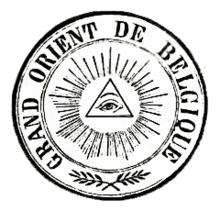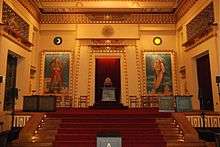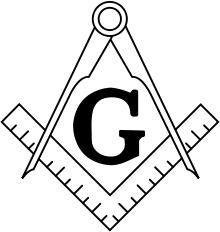Grand Orient of Belgium

The Grand Orient of Belgium (French: Grand Orient de Belgique, Dutch: Grootoosten van Belgie; or G.O.B.) is a Belgian cupola of masonic lodges which is only accessible for men, and works in the basic three symbolic degrees of freemasonry.
History
The Grand Orient of Belgium was founded in 1833, three years after the independence of Belgium. The Grand Orient joins the Grand Orient of France and other Continental jurisdictions in not requiring initiates to believe in a Supreme Being (Great Architect of the Universe). This meant that in the 1870s the Orient broke with the United Grand Lodge of England.
During World War II, members of the Grand Orient of Belgium founded the Lodge Liberté chérie in a Nazi concentration camp and the Lodge l'Obstinée in a Nazi prisoner-of-war camp.
In 1959 five lodges of the Grand Orient of Belgium founded the Grand Lodge of Belgium in order to regain recognition by the United Grand Lodge of England which was lost in 1979. In 1989 the Grand Orient of Belgium, the Grand Lodge of Belgium, the Women's Grand Lodge Of Belgium and the Belgian Federation of Le Droit Humain signed an agreement of mutual recognition.
Notable members

- Jules Anspach, 1829-1879.
- Jules Bordet, 1870-1961, Nobel Prize in Physiology or Medicine (1919)
- François Bovesse, 1890-1944.
- Léo Campion, 1905-1992.
- Charles De Coster, 1827-1879.
- Ovide Decroly, 1871-1932.
- Eugène Goblet d'Alviella, 1846-1925.
- Victor Horta, 1861-1947.
- Paul Hymans, 1865-1941, first President of the League of Nations
- Henri La Fontaine, 1854-1943, Nobel Peace Prize (1913)
- Charles-Joseph de Ligne, 1735-1814.
- Charles Magnette, 1863-1937.
- Constantin Meunier, 1831-1905.
- Edmond Picard, 1836-1924.
- Jean Rey, 1902-1983, second President of the European Commission
- Félicien Rops, 1833-1898.
- Goswin de Stassart, 1780-1854, First Grand Master 1833 - 1841,
- Emile Vandervelde, 1866-1938.
- Théodore Verhaegen, 1796-1862, Grand Master 1854 - 1862, founder of the Université Libre de Bruxelles
- Henri Vieuxtemps, 1820-1881.
Relationship with the Roman Catholic Church
The GOB has often had a difficult relationship with the Roman Catholic Church (see Catholicism and Freemasonry). The Grand Orient was seen as the main source of anticlericalism during the end of the 19th century and the beginning of the 20th century.
See also
- Freemasonry in Belgium
- History of Freemasonry in Belgium
- International Secretariat of the Masonic Adogmatic Powers
- Regular Grand Lodge of Belgium
References
- Hugo De Schampeleire, Els Witte, Fernand V. Borne, Bibliografische bijdrage tot de geschiedenis der Belgische vrijmetselarij, 1798-1855, Brussel 1973
- Andries Van den Abeele, De Kinderen Van Hiram, Brussel, Roularta, 1991
- Hervé Hasquin (ed.), Visages de la franc-maçonner ie belge du XVIIIe au XXe siècle, Ed. ULB, Bruxelles, 1983
- Michel Huysseune, Vrijmetselarij, mythe en realiteit, EPO pub., 1988
- Jo Gérard, La franc-maçonnerie en Belgique, Bruxelles 1988
